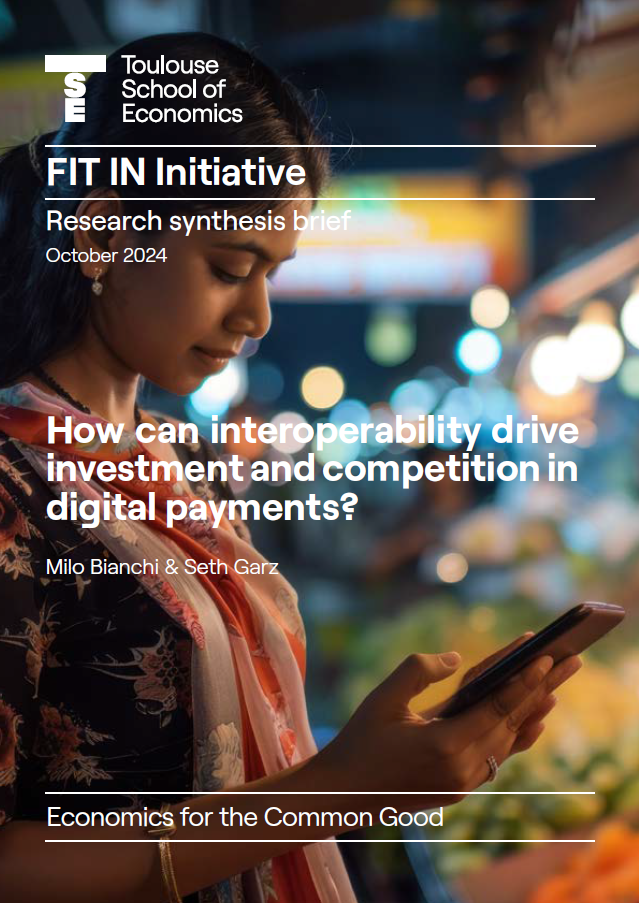Policy papers
In this section, find popularized elements of research work: research synthesis briefs and policy papers.
Research insights
#October, 2024
This collaborative project, which involved many TSE researchers and external contributors, has resulted in an overview document presenting the main research insights from the Initiative as well as the resulting key policy recommendations.
Research synthesis briefs
#October, 2024
How can interoperability drive investment and competition in digital payments? by Milo Bianchi & Seth Garz.
The authors indicate key ideas for practitioners to implement Instant Interoperable Payment Systems (IIPS).
How can data sharing help improve access credit? by Matthieu Bouvard & Seth Garz
The authors address a question on implications for lending in low- and middle-income countries (LMICs).
How do instant interoperable payment systems transform modern economies? by Hakan Özyilmaz
The author present a synthesis of recent evidence on IIPSs as digital public infrastructure.
Policy papers
#October, 2024
Digital payments: Does interoperability harm consumers? by Milo Bianchi & Andrew Rhodes.
The authors show why consumers may not always benefit from platform-level interoperability.
Should mobile money agents work for multiple networks? by Matthieu Bouvard & Catherine Casamatta.
Researchers explain the benefits of allowing mobile money agents to contract with multiple operators.
# July, 2024
Can banks keep up with mobile money? by Emmanuelle Auriol & Alexia González Fanfalone, July 2024.
They conducte a survey to assess the impact of mobile money on financial inclusion in Kenya.
# February, 2024
Digital Infrastructures and Financial Inclusion
> How can phones improve financial inclusion? by Lukasz Grzybowski, Valentin Lindlacher and Onkokame Mothobi, February, 2024.
They combine detailed survey and satellite data to study how mobile networks impact financial inclusion.
> Shared infrastructure can bridge the digital divide, by Georges Vivien Houngbonon, Marc Ivaldi, Emil Palikot and Davide Strusani, February, 2024
They show how shared ownership of telecoms infrastructure can have important benefits for firms and consumers in developing countries.
# January, 2024
Digital payment systems in emerging economies: Lessons from Kenya, India, Brazil, and Peru by J. Aurazo and F. Gasmi, January, 2024
They address a question on digital payments using a descriptive approach to highlight lessons that can be learned from an in-depth examination of successful experiences in emerging economies.
# October, 2022
Charges in payment systems by Vatsala Shreeti, policy affiliate, in collaboration with FIT IN Initiative’s team at the Toulouse School of Economics, October 2022.
Building on insights from the economics literature, particularly on two-sided markets, and experiences from other jurisdictions, the policy paper sheds light on issues related to pricing of digital payment methods, in particular on debit cards and Unified Payments Interface (UPI) transactions. This policy paper was prepared in response to a discussion paper by the Reserve Bank of India.
# December, 2021
Mobile Payments and Interoperability: Insights from the Academic Literature by Milo Bianchi, Matthieu Bouvard, Renato Gomes, Andrew Rhodes and Vatsala Shreeti, December, 2021
In this policy paper, TSE researchers connected various streams of academic literature to shed light on how the degree of interoperability in mobile payments affects market outcomes and welfare. They organized their discussion around four dimensions of interoperability:
- Mobile network interoperability in connection with the IO literature on tying.
- Platform level interoperability in light of the literature on compatibility. We also build on the behavioral IO literature to suggest how the effects of interoperability may be very heterogeneous across various types of firms and consumers, or even backfire.
- Interoperability in the cash-in-cash-out agent network, in light of the literature on co-investment in network industries, and of more specific studies on ATMs’ interoperability.
- How the literature in banking and on data ownership can be used to understand interoperability of data.
They conclude with some broader remarks on policy implications and on possible directions for future research.
ctions for future research.




